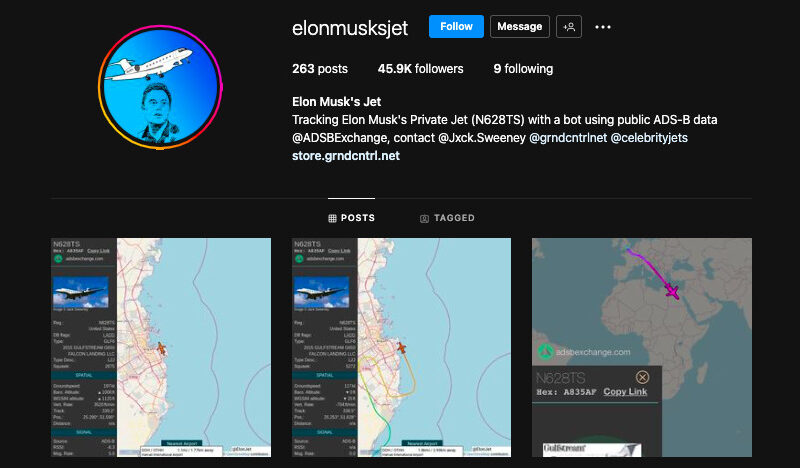Putting the private back in private jet – CJI One Minute Week 588

A screen grab of the Instagram account tracking Elon Musk's jet - @elonmusksjet.
Elon Musk has been generating headlines at a breakneck speed, and this week’s news has been focused on his private jet and its whereabouts, leading the billionaire to announce he is taking legal action against a 20-year-old who has been tracking his travels.
Jack Sweeney, the owner of the ElonJet account on Twitter, used public flight-tracking information to keep tabs on where Musk’s jet was going, up until he was banned from the website this week. Musk’s attempts to silence the account have only garnered it more attention, and it has no doubt captured the attention of those in the business aviation market.
But legal action to enable private jets to fly under-the-radar will be tricky to enforce, according to aviation lawyers. Automatic Dependent Surveillance-Broadcast (ADS-B), which is being used to track the jets, is necessary to ensure safe skies, so it’s difficult to see how any legal action could allow its use to be side-stepped.
“Safety is always going to be more important than privacy,” David Hernandez, shareholder at Vedder Price tells Corporate Jet Investor (CJI). “The harder it is to obtain ADS-B information, the harder it’s going to be for someone to use it for its intended purpose for safety.”
Hernandez says that there is legislation in place to increase the level of privacy and security of ADS-B information, so that the only people able to track the flight data of private flights are specific individuals with licenses. However, there are loopholes around this that people are able to take advantage of. “You, me or anybody could go on Amazon and buy a receiver and an antenna and get that same information from anybody in the world, and that’s what that guy is doing with Elon,” he says. “If he’s banned from Twitter, he’ll just switch to Instagram or Facebook or start his own web page, you can’t stop him.”
Keri Dowling, president, Air Law Office, agrees that it is a serious issue: “The real issue for people who own private jets and who are flying around to support their businesses, or their philanthropic endeavours, is security. A lot of these people go into the private aviation sector because of the level of security they need that just can’t be met on commercial flights, so security is a huge concern.”
Dowling says there are programmes that the FAA has introduced to try to protect security, such as the Limiting Aircraft Data Displayed (LADD) and the Privacy Impact Assessment (PIA). These aim to help disguise the identity of those flying, although they can be bypassed. “The programmes have their limitations, which is how Elon Musk has been able to be followed, and it’s of huge concern for my clients,” says Dowling.
Musk claimed on Twitter that tracking his jet could lead to an “assassination”, Hernandez says there is another threat for companies; corporate espionage. “It’s very important to many of my clients, particularly those in private equity, because they’re involved in mergers and acquisitions,” he says. “So people try to track many of my clients to see what cities they fly to, to determine whether or not they’re going to buy a specific company. When you have a client in Pittsburgh all the time, and everyone knows that a company in Pittsburgh is up for sale, people may start trying to buy up the stock of that company.” Traders can subscribe to a Nasdaq feed showing corporate flights.
So apart from spending $44bn to buy Twitter and close down the accounts that track you, what can owners do? Dowling and Hernandez advise their clients to look into options like setting up trust companies, using the LADD and PIA programmes to use code names rather than tail numbers and real names, and even advising people to fly by charter instead. Fractional ownership is also very private. No one knows who is flying by NetJets, Flexjet or Airshare for example.
The National Business Aviation Association (NBAA) has been working to make end-users aware of the risks to privacy and security, with advice on how to submit LADD requests on their site. Dan Hubbard, senior vice president of Communications at NBAA says no one should have to surrender their safety or security when getting on a jet. He says: “The need to allow for an opt-out from having your flight tracked and published in real time by anyone, anywhere in the world, with any motive and an internet connection, has long been recognised in bipartisan legislation repeatedly passed by Congress.”
Dowling adds: “Musk may have a very controversial name right now, but this will be closely followed by people like Jeff Bezos and George Soros and other people impacted by this ability to follow flights. It’s something that’s going to be very impactful on our industry.”
In the meantime, follow us on Twitter @CorpJetInvestor (we have not been banned – yet).
Subscribe to our free newsletter
For more opinions from Corporate Jet Investor, subscribe to our One Minute Week newsletter.








